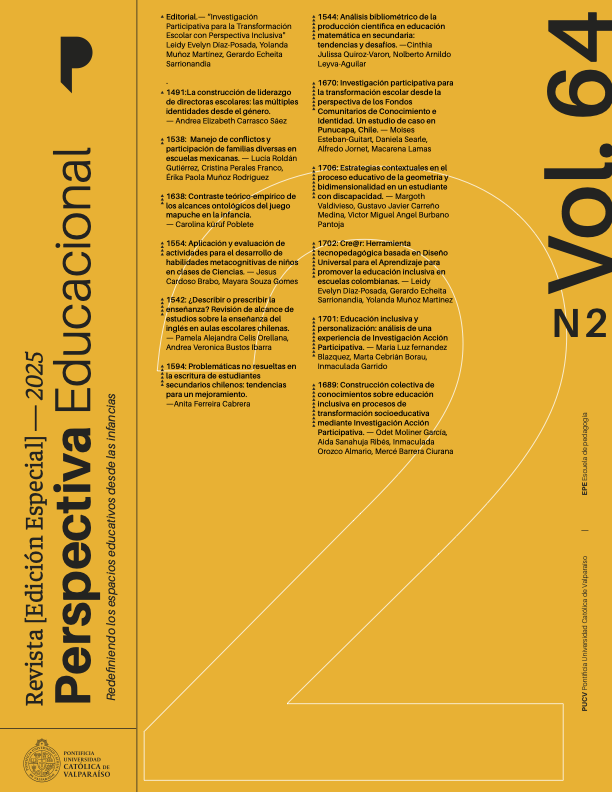Diverse Families' Conflict Management and Participation in Mexican Schools
DOI:
https://doi.org/10.4151/07189729-Vol.64-Iss.2-Art.1538Keywords:
Conflict resolution discrimination family social inclusion parent participationAbstract
This article explores the experiences of non-traditional families regarding their school participation and their conflict management processes. It presents the initial qualitative results of the broader project called “Pedagogy of hope and nonviolence: educational proposal for the inclusion of new family models”, which was divided in four different lines of development. The first one, was a state of the art about the experiences of diverse families in educational spaces in the last 20 years in Mexico and Latin America. The second, analyses the regulatory framework to identify merits and obstacles related to educational inclusion of diverse families. The third, reviewed different studies that explore teachers’ experiences in relation to diverse families and their inclusion. The last line was a qualitative research about the experiences of diverse families in educational centres and the initiatives to achieve their participation and inclusion in educational contexts; this article focuses on this fourth line.
Specifically, the information presented is based on the evidence provided by six women representing different types of family: extended, reconstituted, single-parent, by adoption and homoparental. Even though an effort was made to interview families according to the specific established categories mentioned before, it was found that the conformation of families cannot be classified in one single category, since their family’s dynamics and members can be positioned in different categories at the same time.
The results show that the interviewed families’ participation is limited to schools’ requirements, which is normally directed from the schools to the parents to express particular needs or share information about the specific engagement needed. Although there is a basic notion of families seen as dynamic structures with diverse forms of conformation, these approaches are usually based on the conception of traditional families.
One of the biggest obstacles expressed by the mothers to participate in school activities is their lack of time, which should be considered in relation to other context elements, like their productive and reproductive roles, family structure, and the support they have for parenting.
Whereas their participation is limited, families feel included as long as teachers keep them informed of their children’s performance and they attend school’s events, which is classified as an informative and fictitious participation (Simón y Barrios, 2019; Valls-Carol et al., 2014).
On the other hand, there is evidence of conflict in the relations between schools and families, but the expressions about this category are less systematic. This could be due to their lack of tools to express and manage conflicts, since there is a negative perception about it.
In conclusion, even though diverse families’ participation and conflict management schemes are the same as other traditional families, their diversity hinders their participation, because mothers usually play productive and reproductive roles, which makes it harder to establish relationships with schools. So, their participation is not inclusive, and they do not participate in decision making processes. The perception of conflict management perception agrees with what was found in other research (De la Peña & Lozano, 2017; Perales Franco, 2022), which highlights the importance of finding different ways of looking into it to explore more about this item.
References
Baquedano-López, P., Alexander, R., & Hernández, S. (2013). Equity Issues in Parental and Community Involvement in Schools: What Teacher Educators Need to Know. Review of Research in Education, 37(1), 149-182. https://doi.org/10.3102/0091732X12459718
Barton, L. (2009). Estudios sobre discapacidad y la búsqueda de la inclusividad: Observaciones. Revista de educación, 349, 137-152. http://www.revistaeducacion.mec.es/re349/re349_07.pdf
Blanco, T. (2015). Parentalidades en familias diversas. Revista de Ciencias Sociales (Cr), II(148), 39-48. https://doi.org/10.15517/rcs.v0i148.21201
Booth, T., & Ainscow, M. (2000). Índice de Inclusión. CSIE.
Braun, V., & Clarke, V. (2006). Using thematic analysis in psychology. Qualitative Research in Psychology, 3(2), 77-101. https://doi.org/10.1191/1478088706qp063oa
Cascón Soriano, F. (2000). Educar en y para el conflicto. Cátedra UNESCO sobre paz y derechos humanos. https://escolapau.uab.cat/img/docencia/recurso001.pdf
Castillo, F. J., & Ramírez, A. (2020). El derecho a la paz en el ámbito educativo: un aporte a la mediación de conflictos. Revisa Científica UISRAEL, 7(3), 11-24. https://doi.org/10.35290/rcui.v7n3.2020.262
Chase, S. E. (2015). Investigación Narrativa. En N. K. Denzin, & Y. S. (Coords.), Métodos de recolección y análisis de datos. Manual de Investigación Cualitativa Volumen IV (pp. 58-112). Gedisa Editorial.
De la Peña, A. A., & Lozano, J. E. (2017). Transformando Conflictos en Familias del Suroriente de Barranquilla: Una Experiencia desde la Investigación Acción Participación (IAP). Artigos, Psicología Social, 29, e167127. https://doi.org/10.1590/1807-0310/2017v29167127
Deslandes, R. (2019). A framework for school-family collaboration integrating some relevant factors and processes. Aula Abierta, 48(1), 11-18. https://doi.org/10.17811/rifie.48.1.2019.11-18
Diario Oficial de la Federación. (2019). Decreto por el que se expide la Ley General de Educación y se abroga la Ley General de la Infraestructura Física Educativa. Secretaría de Gobernación. https://dof.gob.mx/nota_detalle.php?codigo=5573858&fecha=30/09/2019#gsc.tab=0
Echeverría-Castro, S., Sandoval-Domínguez, R., Sotelo-Castillo, M., Barrera-Hernández, L., & Ramos-Estrada, D. (2021). Beliefs About Parent Participation in School Activities in Rural and Urban Areas: Validation of a Scale in Mexico. Frontiers in Psychology, 5(1), 79-91. https://doi.org/10.3389/fpsyg.2020.00639
Epstein, J. L. (2010). School/Family/Community Partnerships: Caring for the Children We Share. Phi Delta Kappan, 92(3), 81-96. https://doi.org/10.1177/003172171009200326
García, B. Y. (2008). Familia, escuela y barrio: un contexto para la comprensión de la violencia escolar. Revista Colombiana de Educación, (55), 108-124. https://revistas.pedagogica.edu.co/index.php/RCE/article/view/7573/6089
Goetz, J. P., & LeCompte, M. D. (1984). Etnografía y diseño cualitativo en investigación educativa. Ediciones Morata, S.A.
Guilherme, A. (2017). Understanding conflict resolution philosophically in a school setting: Three different kinds of violence and dialogue. Journal of Peace Education, 14(2), 215-234. https://doi.org/10.1080/17400201.2017.1323728
Imrie, S., & Golombock, S. (2020). El Impacto de las Nuevas Formas de Familia en la Crianza y el Desarrollo Infantil. Annual Review of Developmental Psychology. https://doi.org/10.1146/annurev-devpsych-070220-122704
Instituto Nacional de Estadística y Geografía. (2017). Encuesta Nacional de los Hogares (ENH) 2017.https://www.inegi.org.mx/programas/enh/2017/
Instituto Nacional de Estadística y Geografía. (2020). Mapas. Características de los hogares. https://www.inegi.org.mx/temas/hogares/
López, M. (2022). Anexo 14. Otros Productos de la Propuesta 309451. Pedagogía de la esperanza y la no violencia: Propuesta educativa para la inclusión de los nuevos modelos de familia. Universidad Iberoamericana.
Martiniello, M. (1999). Participación de los Padres en la Educación: Hacia una Taxonomía para América Latina. Development Discussion Papers Central America Project Series, Harvard University. https://www.incae.edu/sites/default/files/hiid709-cen1202.pdf
Misra, J., Curington, C., & Green, V. (2021). Methods of intersectional research. Sociological Spectrum, 41(1), 9-28. https://doi.org/10.1080/02732173.2020.1791772
Muñoz Rodríguez, É. (2022). Interacción de categorías sociales en la relación familias-escuela ¿cómo favorece u obstaculiza la participación? Revista Latinoamericana de Estudios Educativos, 52(3), 337-370. https://doi.org/10.48102/rlee.2022.52.3.519
Oudhof, H., Mercado, A., & Robles, E. (2018). Cultura, diversidad familiar y su efecto en la crianza de los hijos. Estudios Sobre las Culturas Contemporáneas, XXIV(48), 65-84. https://revistasacademicas.ucol.mx/index.php/culturascontemporaneas/article/view/609/560
Pepper, C., & Wildy, H. (2009). Using narratives as a research strategy. Qualitative Research Journal, 9(2), 18-26. https://doi.org/10.3316/QRJ0902018
Perales Franco, C. (2021). Diálogo, separación y suspensión: prácticas de manejo de conflictos en escuelas primarias mexicanas. Sinéctica, (57), 1-19 https://doi.org/10.31391/s2007-7033(2021)0057-008
Perales Franco, C. (2022). School-community relationships: A study of school convivencia in Mexico. Universidad Iberoamericana. https://ibero.mx/sites/all/themes/ibero/descargables/publicaciones/school-community-relationships.pdf
Perales Franco, C. (2024). Inclusion of Families in Basic Education in Mexico. Policies, Practices and Cultures. In S. Romero-Contreras, I. García-Cedillo, & L. Moreno-Medrano (Eds.), Intercultural and Inclusive Education in Latin America: Trajectories, Perspectives and Changes (pp. 113-126). Emerald.
Perales Mejía, F., & Escobedo Carrillo, M. (2016). La participación social en la educación: Entre propuestas innovadoras y tradición educativa. Revista electrónica de investigación educativa, 18(1), 69-81. http://redie.uabc.mx/redie/article/view/738
Pérez, A., & Reinoza, M. (2011). El educador y la familia disfuncional. Educere, 15(52), 629-634. http://erevistas.saber.ula.ve/index.php/educere/article/view/13316/21921924408
Ramírez-González, A. (2015). Evaluación diagnóstica de la relación escuela y comunidad: El caso de una escuela en Santo Domingo del Roble de Santa Bárbara de Heredia. Revista Electrónica Educare, 19(1), 43-65. http://dx.doi.org/10.15359/ree.19-1.3
Romero Gonzaga, R. (2017, noviembre 22). La participación social en educación como un derecho colectivo. Presentado en XIV Congreso Nacional de Investigación Educativa, San Luis Potosí.
Simón, C., & Barrios, Á. (2019). Las familias en el corazón de la educación inclusiva. Aula Abierta, 48(1), 51-58. https://doi.org/10.17811/rifie.48.1.2019.51-58
Solís Castillo, F., & Aguiar Sierra, R. (2017). Análisis del papel del involucramiento de la familia en la escuela secundaria y su repercusión en el rendimiento académico. Sinéctica, 49, 1-22. https://sinectica.iteso.mx/index.php/SINECTICA/article/view/706/978
Universidad Nacional Autónoma de México. (2017). Existen en México tres grupos de familias con 11 variantes: estudio de la UNAM. https://www.dgcs.unam.mx/boletin/bdboletin/2017_335.html
Vaccotti, R. (2019). La relación familia-institución educativa en enseñanza media: perspectivas de docentes de secundaria. Revista Páginas de Educación, 12(1), 164-178. https://doi.org/10.22235/pe.v12i1.1787
Valdés, Á. A., & Sánchez, P. A. (2016). Las creencias de los docentes acerca de la participación familiar en la educación. Revista electrónica de investigación educativa, 18(2), 105-115. http://redie.uabc.mx/redie/article/view/1174
Valdés Dávila, M. (2019). La participación parental y el logro académico de los estudiantes. Estudio de caso de una escuela primaria en México. Diálogos Pedagógicos, 17(33), 1-17. https://doi.org/10.22529/dp.2019.17(33)01
Valls-Carol, R., Prados-Gallardo, M., Aguilera-Jiménez, A., & De Sevilla, U. (2014). El proyecto includ-ed: Estrategias para la inclusión y la cohesión social en Europa desde la inclusión. https://www.berrigasteiz.com/monografikoak/inklusibitatea/pubs/includ-ed_proyecto.pdf
Downloads
Published
How to Cite
Issue
Section
License
Copyright (c) 1969 Cristina Perales Franco, Lucía Roldán Gutiérrez, Érika Paola Muñoz Rodríguez

This work is licensed under a Creative Commons Attribution-ShareAlike 4.0 International License.
The authors grant an exclusive licence, without time limit, for the manuscript to be published in the Perspectiva Educacional journal, published by the Pontificia Universidad Católica of Valparaíso (Chile), through the School of Pedagogy.





